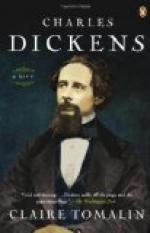First impressions, however, were not altogether satisfactory. Dickens owns to a pang when he was “set down” at Albaro, a suburb of Genoa, “in a rank, dull, weedy courtyard, attached to a kind of pink jail, and told he lived there.” But he immediately adds: “I little thought that day that I should ever come to have an attachment for the very stones in the streets of Genoa, and to look back upon the city with affection, as connected with many hours of happiness and quiet.” In sooth, he enjoyed the place thoroughly. “Martin Chuzzlewit” had left his hands. He was fairly entitled for a few weeks to the luxury of idleness, and he threw himself into doing nothing, as he was accustomed to throw himself into his work, with all energy. And there was much to do, much especially to see. So Dickens bathed and walked; and strolled about the city hither and thither, and about the suburbs and about the surrounding country; and visited public buildings and private palaces; and noted the ways of the inhabitants; and saw Genoese life in its varied forms; and wrote light glancing letters about it all to friends at home; and learnt Italian; and, in the end of September, left his “pink jail,” which had been taken for him at a disproportionate rent, and moved into the Palazzo Peschiere, in Genoa itself: a wonderful palace, with an entrance-hall fifty feet high, and larger than “the dining-room of the Academy,” and bedrooms “in size and shape like those at Windsor Castle, but greatly higher,” and a view from the windows over gardens where the many fountains sparkled, and the gold fish glinted, and into Genoa itself, with its “many churches, monasteries, and convents pointing to the sunny sky,” and into the harbour, and over the sapphire sea, and up again to the encircling hills—a view, as Dickens declared, that “no custom could impair, and no description enhance.”
But with the beginning of October came again the time for work; and beautiful beyond all beauty as were his surroundings, the child of London turned to the home of his heart, and pined for the London streets. For some little space he seemed to be thinking in vain, and cudgelling his brains for naught, when suddenly the chimes of Genoa’s many churches, that seemed to have been clashing and clanging nothing but distraction and madness, rang harmony into his mind. The subject and title of his new Christmas book were found. He threw himself into the composition of “The Chimes.”
Earnest at all times in what he wrote, living ever in intense and passionate sympathy with the world of his imagination, he seems specially to have put his whole heart into this book. “All my affections and passions got twined and knotted up in it, and I became as haggard as a murderer long before I wrote ‘the end,’”—so he told Lady Blessington on the 20th of November; and to Forster he expressed the yearning that was in him to “leave” his “hand upon the time, lastingly upon the time, with one tender




